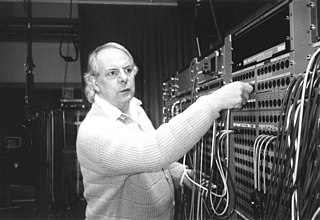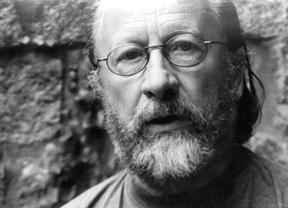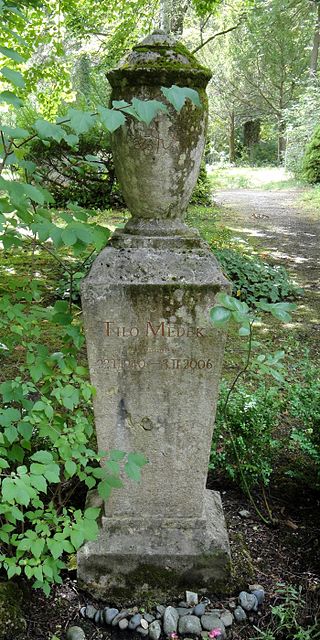Related Research Articles

Karlheinz Stockhausen was a German composer, widely acknowledged by critics as one of the most important but also controversial composers of the 20th and early 21st centuries. He is known for his groundbreaking work in electronic music, for introducing controlled chance into serial composition, and for musical spatialization.
Dieter Schnebel was a German composer, theologian and musicologist. He composed orchestral music, chamber music, vocal music and stage works. From 1976 until his retirement in 1995, Schnebel served as professor of experimental music at the Hochschule der Künste, Berlin.
Nicolaus A. Huber is a German composer.
Wolfgang Fortner was a German composer, composition teacher and conductor.

Claus Bantzer is a German church musician, composer and director.

Georg Katzer was a German composer and teacher. The last master student of Hanns Eisler, he composed music in many genres, including works for the stage. Katzer was one of the pioneers of electronic new music in the German Democratic Republic and the founder of the first electronic-music studio in the GDR. He held leading positions in music organisations, first in the East, then in the united Germany, and received many awards, including the Art Prize of the German Democratic Republic, the National Prize of the German Democratic Republic, the Order of Merit of the Federal Republic of Germany, and the German Music Authors' Prize.
Claus-Steffen Mahnkopf is a German composer, editor and author.
Heinz Winbeck was a German composer, conductor and academic teacher. He is known for five large-scale symphonies, which he programmatically subtitled, such as "Tu Solus" and "De Profundis". As a composition teacher in Würzburg, he shaped a generation of students.
Carl Ueter was a German composer of classical music. From 1950 to his retirement in 1965 he was professor at the Hochschule für Musik Freiburg.
Annesley Black is a Canadian composer.

Tilo Medek, originally Müller-Medek, was a German classical composer, musicologist and music publisher. He grew up in East Germany, but was inspired by the Darmstädter Ferienkurse. He composed radio plays and incidental music. His setting of Lenin's Decree on Peace led to restrictions, and after he showed solidarity with the expatriated Wolf Biermann, he also had to move to the West, where he composed an opera Katharina Blum based on Heinrich Böll's novel, and worked in education. He received international awards from 1967 onwards.

Johannes Kalitzke is a German composer and conductor. After studying in Cologne and at the IRCAM in Paris, he was chief conductor at the Musiktheater im Revier in Gelsenkirchen for several years, then led the ensemble musikFabrik and composed operas on commissions in Germany and Austria. He has been Professor of Conducting at the Salzburg Mozarteum from 2015.

Frank Strobel is a German conductor known for premieres and performances of works by composers Sergei Prokofiev, Franz Schreker and Siegfried Wagner. He is authorized arranger and editor of works by the composer Alfred Schnittke and since 2001 has helped this composer built a reputation as a film composer in the German-speaking world. In addition, Strobel has been a pioneer in the interdisciplinary field of film and music for many years and is one of the protagonists of the "Film in concert" movement.
Rolf Riehm is a German composer who wrote stage and orchestral works as well as music for ensembles and solo instruments. He began as an oboist and music teacher and was later a professor of music theory at the Hochschule für Musik und Darstellende Kunst Frankfurt am Main for several years.
Gösta Neuwirth is an Austrian musicologist, composer and academic teacher. He studied in Vienna and Berlin, where he wrote a dissertation on harmony in Franz Schreker's Der ferne Klang. He has taught at universities and music schools including the Musikhochschule Graz, University of Graz, Universität der Künste Berlin and University of Freiburg. His compositions include a string quartet and a chamber opera.
Mathias Spahlinger is a German composer. His work takes place in a field of tension between the most diverse musical influences and styles: between Renaissance music and Jazz, between musique concrète and Webernian minimalism, between noise, improvisation and notation, between aesthetic autonomy and political consciousness, Spahlinger's works carry out conflicts for which there are no fixed models.
Johannes Menke is a German music theorist, University lecturer and composer.
Paul-Heinz Dittrich was a German composer and academic teacher. Based in East Berlin, he focused on chamber music, with many works inspired by poetry. His works were performed earlier in the West than in the East. He was an influential composer of contemporary music in Germany who taught internationally, including in the United States, Israel, and Korea.

Xaver Paul Thoma is a German composer of contemporary music, violist and music educator.
Rainer Böhm was a German composer.
References
- ↑ Korrigendum in: Die Musik in Geschichte und Gegenwart. 2nd edition. Personenteil, Register, 2007.
- ↑ "Der müde Tod, filmportal.de". www.filmportal.de. Retrieved 21 December 2018.
- ↑ Auszeichnung beim 24. Filmkunstfest Mecklenburg-Vorpommern. Prof. Cornelius Schwehr erhält Preis für beste Filmmusik für „Zeit der Kannibalen“